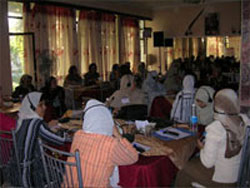Immediately following Afghanistan's historic September 18th parliamentary elections, Institute trainers Nina Sughrue and Jacqueline Wilson, in collaboration with Women Waging Peace and Women for Afghan Women, conducted a four-day workshop for Afghan women leaders in Kabul, Afghanistan.
Immediately following Afghanistan's historic September 18th parliamentary elections, Institute trainers Nina Sughrue and Jacqueline Wilson, in collaboration with Women Waging Peace and Women for Afghan Women, conducted a four-day workshop for Afghan women leaders in Kabul, Afghanistan. They used the workshop to build the capacity of Afghan women leaders by enhancing their communications, problem-solving, negotiation, and mediation skills, and to help them strategize and successfully advocate for their needs in their country. Additionally, the workshop provided a forum for civil society leaders and ministry officials to network and build relationships that can help strengthen and empower Afghan women.
The thirty-four participants included parliamentary candidates, ministry officials, and civil society leaders. The participants hailed from all over Afghanistan´s provinces and spanned a broad spectrum of age, ethnicity, and experience. The ethnically diverse women were all leaders in the movement for human rights and democratization in Afghanistan.
Women Waging Peace conducted democracy and governance training and the Institute implemented skill-building activities which focused on helping participants refine the tools that would make them more effective negotiators, mediators, and advocates for women's issues in Afghanistan. Particular emphasis was placed on message management, conflict analysis, creative problem solving, collaborative dispute resolution, and consensus-building. Simulations and exercises were tailored to the participants' paramount goal of expanding women's involvement in the political process in Afghanistan. Through role-plays, the workshop integrated specific skills into a broader strategy of empowerment.
Women Waging Peace founder and former ambassador to Austria Swanee Hunt, opened the workshop and facilitated activities the first and second day. A representative from the Women's Ministry gave closing comments encouraging the women to work together utilizing the new skills and strategies taught throughout the workshop.
The participants commented that they have never experienced such interactive skills based training and that they would incorporate the strategies taught in their personal and their professional lives in order to effectively achieve their goals.



